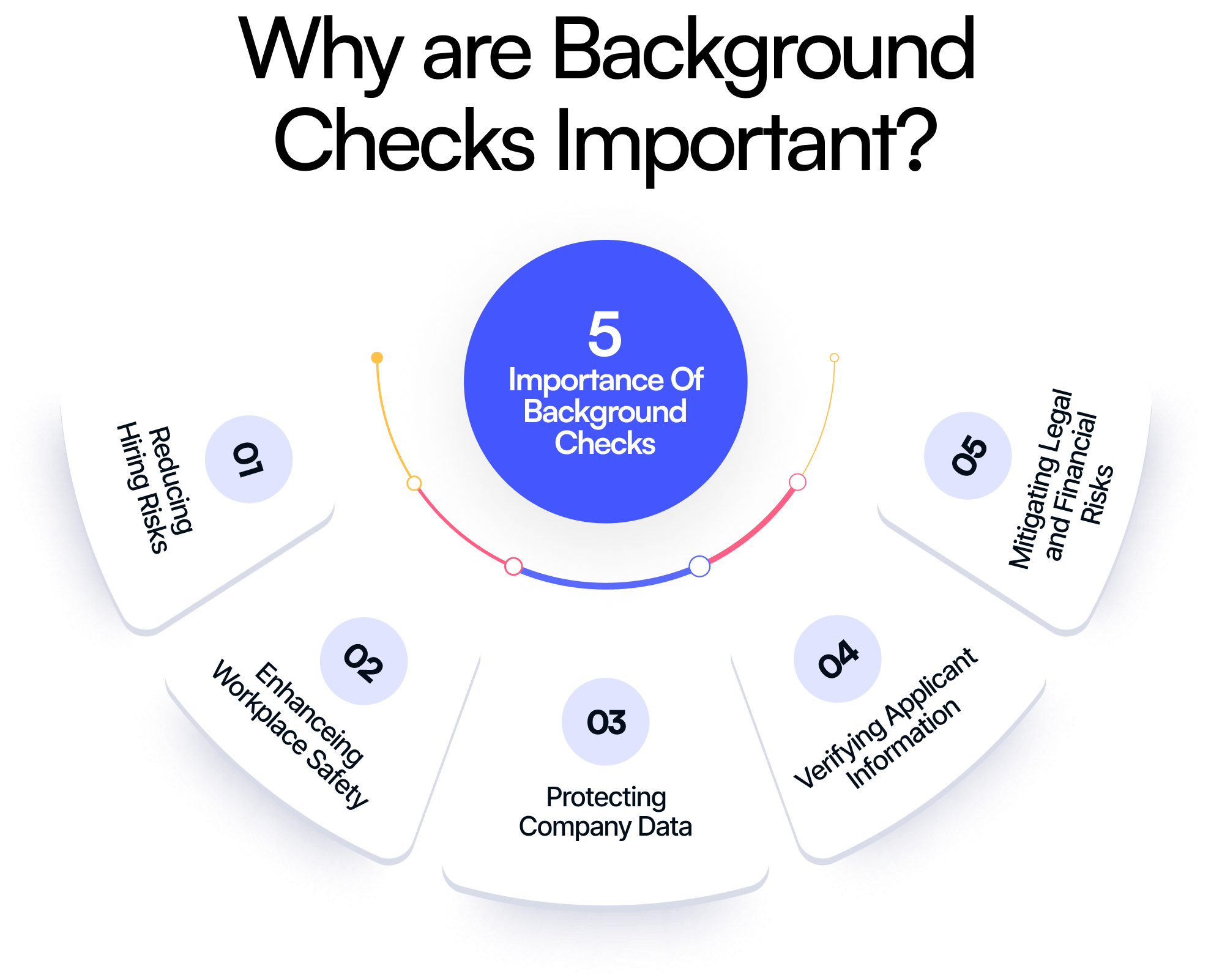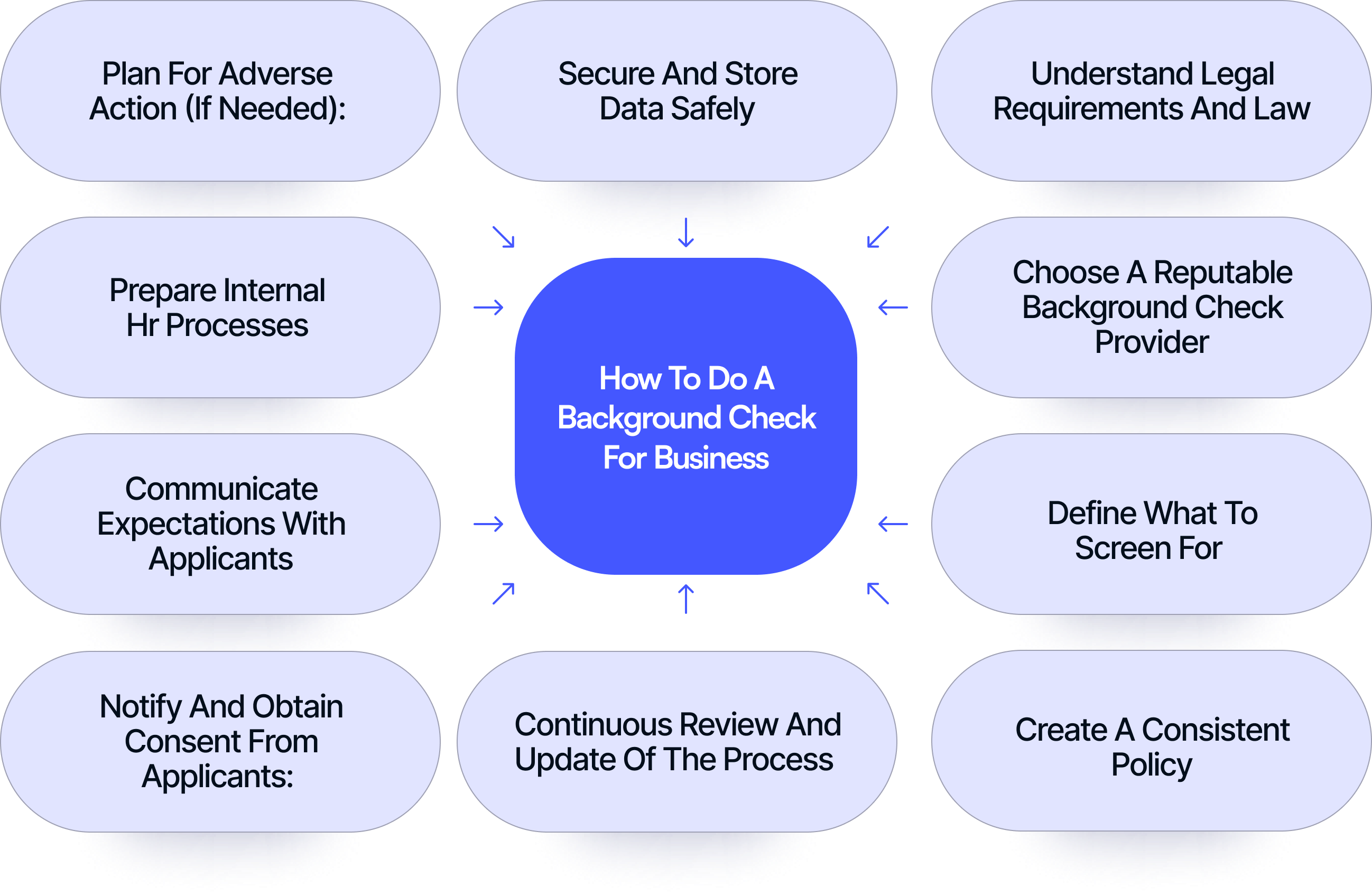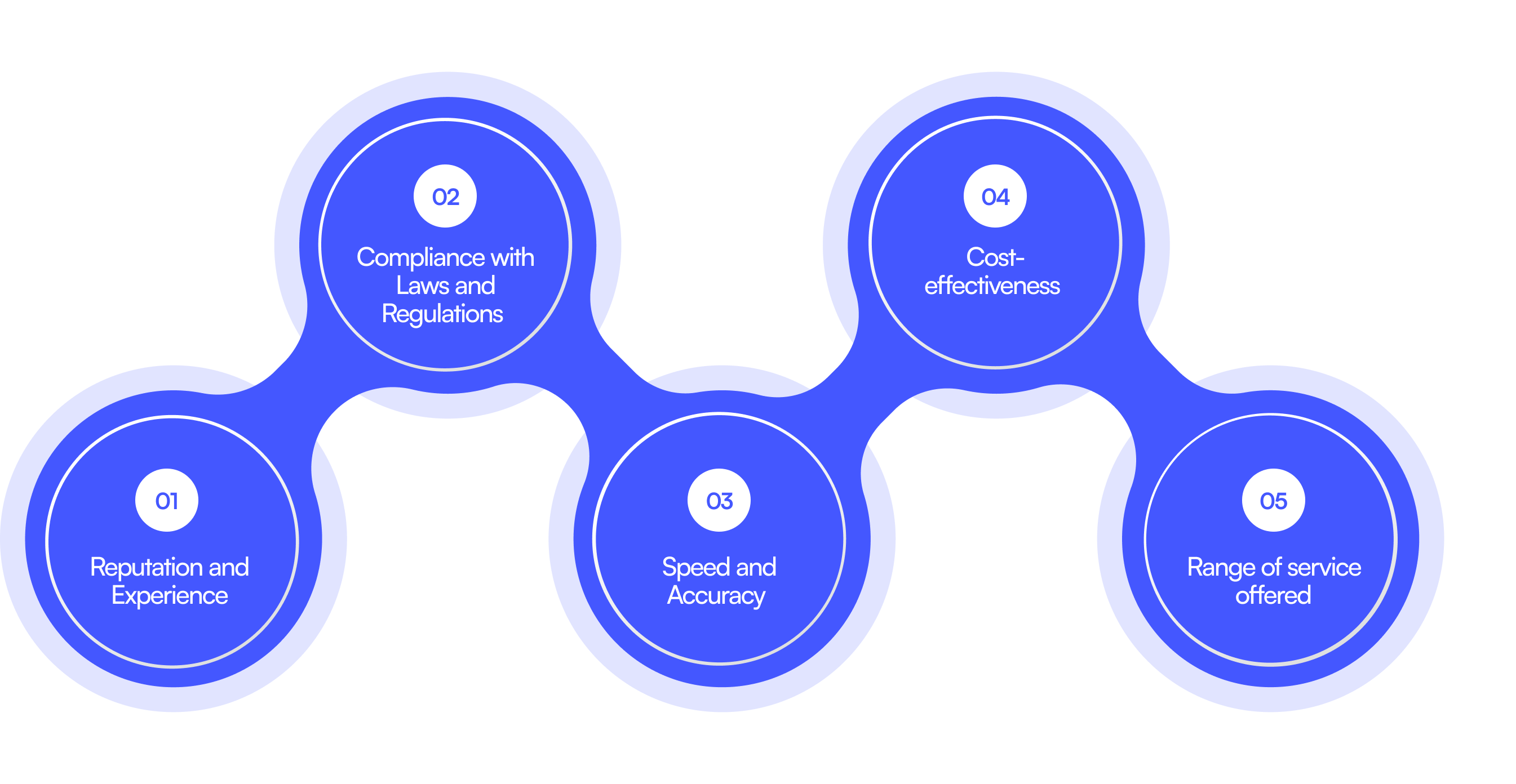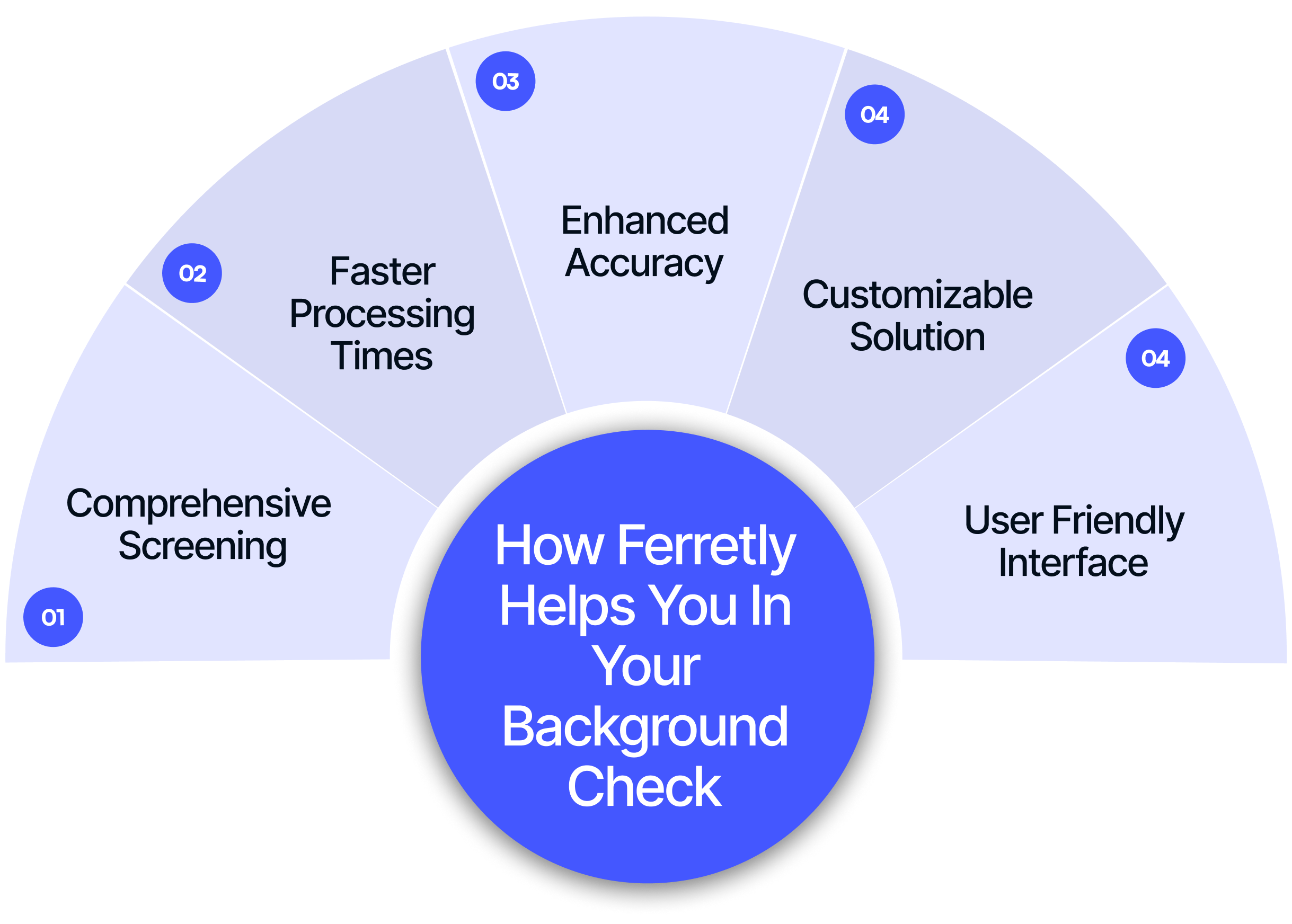What is a Background Check? Comprehensive Guide

A background check is a process used by an organization or individual to verify that a person is who they claim to be, and to review their past record, including confirmation of education, employment history, and any criminal record. This helps employers make informed decisions about potential hires by ensuring that candidates are honest and trustworthy.
This article will cover various aspects of background checks, including how long they take, the types of checks involved and what causes red flags. It will also explore strategies to reduce hiring bias and ensure a fair, compliant hiring process.
This process helps employers make well-informed decisions about potential hires. Learn how utilizing AI-powered background checks can streamline this process and deliver more accurate results.
What is a Background Checks?
A background check is the process of using third-party providers to review of an individual’s history for job opportunities, including their criminal records, credit history, employment, education and other records that may be relevant to a candidate’s suitability for a role. details.
Typically used by employers during the hiring process, it helps assess a candidate’s suitability. However, anyone can conduct a background check to verify someone's history and gather additional information.
Employment background checks are an important component of the hiring process, for both employers and candidates to be aware of their rights during this process, as outlined by the Federal Trade Commission.
Why are Background Checks Important?

A background check can uncover information about an individual, such as employment history, criminal records, credit history, and more. The purpose of the check is to verify that the individual is who they claim to be, identify any potential conflicts, or a combination of both.
This process helps employers reduce the risks associated with hiring, ensuring a safer workplace and safeguarding sensitive company information. Some of the importance of background checks:
- Reducing Hiring Risks: Ensures the candidate is trustworthy and qualified.
- Enhancing Workplace Safety: Identifies any criminal background that could pose a threat.
- Protecting Company Data: Helps prevent access to sensitive information by untrustworthy individuals.
- Verifying Applicant Information: Confirms details like education and work history to avoid hiring based on false claims.
- Mitigating Legal and Financial Risks: Ensures compliance with industry regulations and reduces liability.
What Does an Employment Background Check Include?
An employment background check covers a wide range of details depending on the job role and industry. These checks are designed to verify information about an individual's identity, criminal record, employment history, credit standing, and more.
Background checks include many types details regarding an individual’s identity, social security, past residences, criminal history, employment history, credit, and driving records.
The importance of each aspect may vary based on the position in question. For instance, a role involving financial management may emphasize credit checks, while a position requiring a professional license would focus on verifying credentials.
1. Identity and Education Verification
Verifying a candidate's identity and education is critical in ensuring that they are who they claim to be and possess the qualifications they list. Mismatches in this area can indicate fraud or false credentials.
For roles that require advanced skills or critical decision-making, identity verification tools like behavior analysis can be employed to assess the candidate’s fit beyond their qualifications.
Educational history verification can be conducted through services such as the National Student Clearinghouse, ensuring that degrees and certifications are genuine.
2. Criminal Background Check
Criminal background checks help reveal any criminal activity associated with a candidate. For many organizations, particularly those in regulated industries, this is an essential step to determine if a candidate might pose a risk to workplace safety or compliance.
Remaining compliant with the Fair Credit Reporting Act (FCRA) is vital when conducting these checks, as it governs the use of criminal background information in hiring decisions. Certain crimes may disqualify individuals from particular roles, especially those related to finance, healthcare, or vulnerable populations.
3. Employment History Verification
Verifying past employment is one of the most critical aspects of a background check, as it ensures the candidate has the qualifications and experience they claim. It's common for job applicants to exaggerate or even falsify their work experience.
Studies suggest that 70% of job applicants have lied or would consider lying on their resumes, highlighting the necessity of this step. Verifying this information helps prevent hiring someone under false pretenses and ensures that the candidate is truly qualified for the job.
4. Social Media Background Check
In recent years, social media screening has gained prominence as an essential component of background checks. A candidate's online presence can provide insights into their behavior, values, and how they might interact with colleagues or clients.
A social media background check can reveal inappropriate or harmful behavior, such as discriminatory language, harassment, or other actions that could affect the company's reputation. It allows employers to get a fuller picture of a candidate beyond their resume.
5. Credit Check (for Certain Roles)
For roles involving financial management, sensitive data, or high-level decision-making, a credit check can help employers assess a candidate's financial responsibility and stability.
A poor credit history may raise concerns about an individual's trustworthiness in handling company funds or assets.
This type of check is particularly relevant for positions such as accountants, finance managers, or roles that involve handling large sums of money.
6. Driving Record Check (If Applicable)
For roles that require driving, such as delivery drivers, chauffeurs, or logistics personnel, a driving record check is necessary. This check confirms whether the candidate has a valid license and ensures they have a safe driving history.
The results can highlight any past traffic violations, DUIs, or accidents, all of which are important for determining whether the candidate is suitable for the role.
7. Professional License Verification
Certain positions require professional licenses, such as those in healthcare, law, or engineering. Verifying that a candidate holds the necessary legal certifications ensures that they are qualified and legally allowed to perform their job functions.
Failing to verify professional licenses can lead to significant legal and operational risks for an organization. This step also ensures that licenses are up-to-date and not expired or revoked.
8. Drug Testing (If Required)
In industries where health and safety are paramount, drug testing is often a mandatory part of the background check process. This is especially common in industries like transportation, construction, or healthcare, where impairment could lead to dangerous situations.
Employers can implement drug testing policies to ensure a safe working environment and compliance with industry regulations.
When Do Jobs Conduct Background Checks?
Background checks are typically done at different stages of the hiring process. Some employers may conduct a background check after a conditional offer is made, while others may initiate the process earlier in the screening phase.
It's important for candidates to be aware that a background check can happen at any point before they are formally hired.
How to Do a Background Check for Business

Conducting a background check for business purposes is an essential step in the hiring process, ensuring that candidates meet the necessary qualifications and standards for the role. By conducting thorough and compliant background checks, businesses can protect themselves from hiring risks while fostering trust with candidates. Here's a step-by-step guide on how to perform a background check for business purposes:
- Understand Legal Requirements and Law: Familiarize yourself with federal, state, and local laws governing background checks, including the fair credit reporting act, to ensure compliance and avoid legal issues.
- Choose a Reputable Background Check Provider: Select a reliable background screening service with a strong reputation, positive reviews, and relevant industry experience.
- Define What to Screen For: Identify necessary background checks based on job roles and industry. Common checks include criminal records, employment history, and credit reports.
- Create a Consistent Policy: Develop a standardized policy outlining your background check process, detailing checks performed, how information is used, and criteria for disqualification.
- Notify and Obtain Consent from Applicants: Inform candidates of the background check and obtain their written consent before initiating the process to comply with legal requirements.
- Communicate Expectations with Applicants: Clearly explain the background check process, including timelines and potential impacts on their application, to build trust.
- Prepare Internal HR Processes: Establish procedures for handling background check results and ensure HR staff are trained in these processes.
- Plan for Adverse Action (If Needed): Have a plan for adverse action if concerning information is revealed, including notifying the candidate and allowing them to dispute inaccuracies.
- Secure and Store Data Safely: Implement data security measures to protect sensitive information, ensuring compliance with regulations and limiting access to authorized personnel.
- Continuous Review and Update of the Process: Regularly assess and update your background screening process to reflect legal and industry changes.
- Training for HR and Hiring Teams: Provide training for HR and hiring teams on the background check process, legal compliance, and data handling to ensure informed hiring decisions.
How Employees Prepare for a Background Check
Preparing for a background check can help candidates ensure a smoother hiring process. By taking proactive steps to review their personal, professional, and online history, candidates can address potential issues before they become roadblocks. Here are some key steps to take when preparing for a background check:
- Review Your Records: Check criminal history, credit reports, and personal records for accuracy. Address discrepancies and be ready to explain them.
- Verify Employment History and Educational Background: Ensure that the dates, job roles, degrees, and certifications in your resume align with verifiable information.
- Prepare for Reference Checks: Inform your references in advance. Choose references who can speak positively about your skills and experience.
- Review Your Social Media Presence: Ensure your social media accounts align with the professional image you want to present. Remove inappropriate content and adjust privacy settings.
- Prepare for Drug Screening and Credit Check (If Required): Be aware of the requirements for drug screening or credit checks, especially if the role involves financial responsibility.
- Disclose Any Red Flags Early: If you have a criminal record or employment gaps, disclose these early in the hiring process and provide context.
- Check Your Professional Licenses: Make sure any required professional licenses are valid and up-to-date.
- Understand Your Background Check Rights: Know your rights under the Fair Credit Reporting Act (FCRA) and dispute any inaccurate information found.
- Be Prepared to Discuss Employment or Education Gaps: Have clear explanations for any gaps in your employment or education history.
- Ensure Your Personal Information Is Correct: Confirm that all personal details, such as name and social security number, are accurate to avoid delays.
What to Consider When Choosing a Background Screening Service
When selecting a background screening provider, it’s important to evaluate several key factors to ensure that you choose a service that meets your needs and complies with legal requirements. A reliable background check service helps streamline the hiring process, minimize risk, and ensure that you’re making informed decisions about potential employees. Here are some important considerations when choosing a background screening provider:

- Reputation and Experience: Look for a provider with a strong reputation and extensive experience in the industry. Research client reviews, testimonials, and case studies to ensure they are trusted by other businesses.
- Compliance with Laws and Regulations: The screening service must adhere to relevant laws, such as the Fair Credit Reporting Act (FCRA) and other regional regulations. This ensures that the background check process is lawful and protects both your company and candidates.
- Speed and Accuracy: Choose a provider that offers quick turnaround times without sacrificing accuracy. Delays can slow down the hiring process, but it’s equally important to get reliable, comprehensive results.
- Cost-effectiveness: Compare pricing between providers, keeping in mind that the cheapest option might not always offer the best value. Ensure that the cost aligns with the level of service and accuracy provided.
- Range of Services Offered: Consider the breadth of services the provider offers. A comprehensive provider should offer various types of checks, including criminal, employment, social media, and credit checks, allowing you to tailor screening to your specific needs.
If you're conducting an employment background check for the first time, keep a few key points in mind: for remote hiring, add identity verification for extra security; background check times vary depending on the type of search; ensure your company is verified per FCRA requirements before initiating checks; free background checks carry risks of inaccuracies and delays; consider including reference checks to assess candidates' character; and remember, post-hire background checks may be necessary, especially in certain industries, with an evergreen clause for ongoing consent.
What Causes a Red Flag on a Background Check?
When conducting a background check, certain findings may raise concerns for employers, signaling potential risks or discrepancies in a candidate's history. These red flags can impact the hiring decision, as employers seek candidates who align with their company's values, standards, and the role's requirements. Here are some common factors that can cause a red flag during a background check:
- Criminal Convictions: Any history of serious criminal offenses, particularly those relevant to the job, such as theft or violence, can be a significant red flag for employers.
- Discrepancies in Employment or Education History: Inconsistencies between what a candidate claims on their resume and what can be verified through background checks can lead to concerns about honesty and integrity.
- Negative Social Media Activity: Inappropriate or concerning posts on social media can impact a candidate's perceived professionalism and suitability for the position.
- Poor Credit History (for Financial Roles): A history of financial irresponsibility or significant debt can raise concerns for positions involving financial management or responsibility.
- Frequent Job Changes: A pattern of short tenures at multiple jobs may indicate a lack of commitment or difficulty adapting to workplace environments.
- Gaps in Employment: Unexplained gaps in employment history can lead to questions about a candidate's reliability and work ethic.
- Negative References: Feedback from former employers or colleagues that is consistently negative can indicate potential issues with a candidate's behavior or performance.
How Long Does a Background Check Take?
The duration of a background check can vary depending on several factors, and understanding these factors can help set expectations for both employers and candidates. While some background checks are completed quickly, others may take longer due to the complexity of the screening process or external factors. Here’s a look at what can influence the length of a background check:
- Scope of the Check: More comprehensive checks that include criminal history, credit reports, and employment verification will naturally take longer than simpler checks.
- Provider Efficiency: Different background screening companies have varying turnaround times based on their processes and resources.
- Geographical Factors: Checks that require verification across multiple states or countries may take longer due to different laws and processing times.
- Response Times from Sources: Delays can occur based on how quickly previous employers or educational institutions respond to verification requests.
Most checks typically take anywhere from a few days to a few weeks to complete, with average times ranging from 3 to 10 business days for standard checks.
How Ferretly Helps You in Your Background Check

Ferretly offers AI-powered background screening solutions that simplify and enhance the hiring process in several ways:
- Comprehensive Screening: Our platform conducts extensive background checks that go beyond traditional methods, ensuring all relevant data is considered.
- Faster Processing Times: Leveraging AI technology allows us to streamline the screening process, often resulting in quicker turnaround times compared to manual checks.
- Enhanced Accuracy: AI reduces human error and enhances the reliability of data collected during background checks, providing employers with more trustworthy insights.
- Customizable Solutions: Ferretly allows businesses to tailor their background check processes to meet their specific industry needs and requirements.
- User-Friendly Interface: Our platform is designed for ease of use, allowing HR teams to navigate the screening process smoothly and efficiently.
- Continuous Monitoring: Ferretly provides ongoing monitoring of candidate backgrounds, alerting employers to any changes or updates after the initial screening.
Background Check Guide – Frequently Asked Questions
1. What Does a Background Check Show?
A background check can reveal information about a candidate’s criminal record, employment history, education, credit history, and more.
2. Do All Jobs Do Background Checks?
Not all jobs require background checks, but they are standard in most industries, particularly those involving sensitive information or safety concerns.






